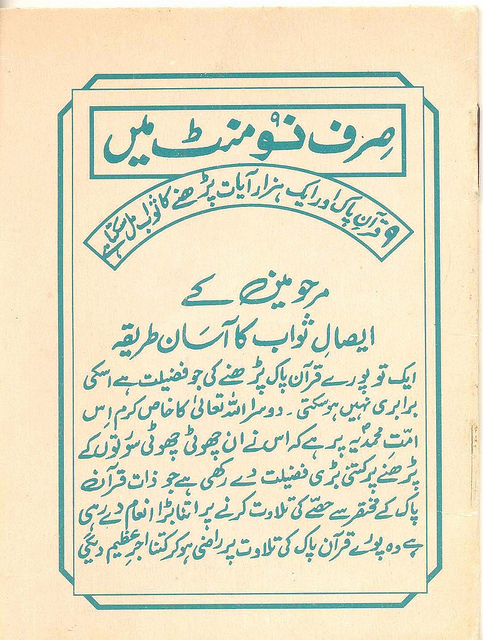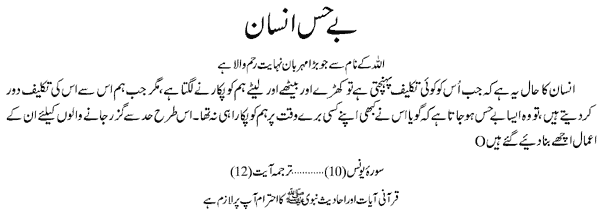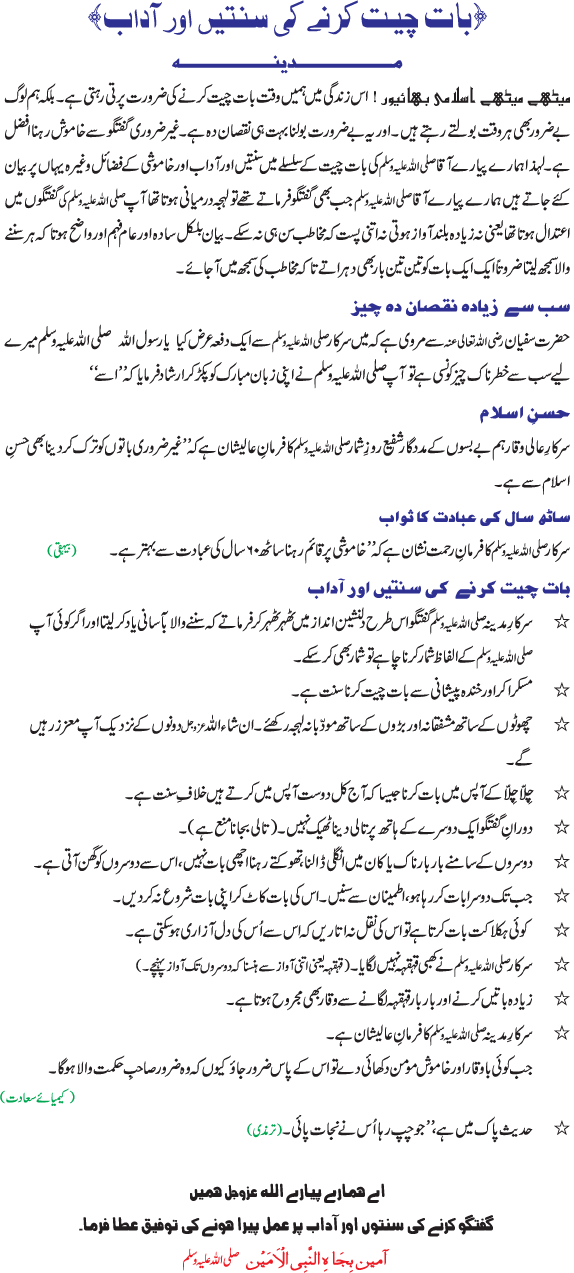[17. Surah Al-Israa : Ayah 26]
![]()
And give to the near of kin his due and (to) the needy and the wayfarer, and do not squander wastefully.
![]()
[17. Surah Al-Israa : Ayah 26]
![]()
And give to the near of kin his due and (to) the needy and the wayfarer, and do not squander wastefully.
![]()

esaal e sawab
Enquire about things before taking action, take action only if are dead sure about the truth, or else you may cause harm
Surah Hujrat Verse 6.
O, believers! If some wicked person brings you any news, inquire thoroughly into its truth (lest) you should cause (undue) harm to a people unknowingly, and later feel regret for what you have done.
When two parties of Muslims fight, reconcile between them
Surah Hujrat Verse 9.
. And if two parties of the Muslims fight, make them reconcile. Then if either of these (parties) commits injustice and aggression against the other, fight against (the party) that is committing aggression till it returns to Allah’s command (of establishing peace). When they revert and submit, make peace between them with equity. And put justice to work. Surely, Allah loves those who do justice.
Surah Hujrat Verse 10.
The truth is that (all) believers are brothers (to one another). So make peace between your two brothers and always fear Allah, so that you may be shown mercy.
Don’t make fun of others and avoid ridiculing others
Quran (Sura al-Hujurat, Verse 11)
O, believers! Let no community ridicule another community. It is likely that they may be better than those (who ridicule) them. Nor should women make fun of other women. It is likely that they may be better than those (who make fun). And do not offend or find fault with one another, nor call each other names. Calling someone wicked or indecent after (he embraces) faith is an extremely evil name. And those who do not turn to Allah in repentance, it is they who are the wrongdoers.

[ALLAH’S Quran – 33:21] You people have always had an exemplar of the Messenger of Allah who displays a good quality as well as a magnificent attribute of a great master whose conduct induces imitation by the one in whose bosom hope springs eternal of Allah’s mercy and of the bliss of the hereafter and applies remembrance to Allah often enough.
Prophet (Peace Be Upon Him) Prayed for forgiveness.
[Muslim, Book #035, Hadith #6563] Abu Musa Ash’ari reported on the authority of his father that Allah’s Apostle (may peace be upon him) used to supplicate in these words:” O Allah, forgive me my faults, my ignorance, my immoderation in my concerns. And Thou art better aware (of my affairs) than myself. O Allah, grant me forgiveness (of the faults which I committed) seriously or otherwise (and which I committed inadvertently and deliberately). All these (failings) are in me. O Allah, grant me forgiveness from the fault which I did in haste or deferred, which I committed in privacy or in public, and Thou art better aware of (them) than myself. Thou art the First and the Last and over all things Thou art Omnipotent.”
[Bukhari, Book #75, Hadith #319] Narrated Abu Huraira: I heard Allah’s Apostle saying. ” By Allah! I ask for forgiveness from Allah and turn to Him in repentance more than seventy times a day.”

The naming of Hazrat Imam Hussain radiallahu taala anhu and Hazrat Imam Hassan radiallahu taala anhu
When Hazrat Imam Hussain radiallahu taala anhu and Hazrat Imam Hassan radiallahu taala anhu were born on different occasions their father wanted to give them other names, but the Holy Prophet Muhammed Salalaahu Alaihi wasallam specifically named them from these names, these names were specially saved and kept for them .
The names of “al-Hasan” and “al-Husayn” were not known before that; i.e. in the state of ignorance (Jahiliyyah). In fact, their grandfather Prophet Muhammad sallallahualayhi wa sallam was the first one who named with them(who called somebody with these names).
Ibn al-Athir said in “Asad al-Ghabah”
Leaders of the youth of paradise
After they were born the Holy Prophet Muhammed Salalaahu Alaihi wasallam did not give them a basharat that they would be in heaven, but he gave a Basaharat that they would be leaders of the youth of paradise.
The Prophet – blessings and peace be upon him – declared: “these two sons of mine are the leaders of the youth in Paradise.”
[Sunan al-Tirmidhi, Kitab al-Manaqib, Manaqib Abi Muhammad al-Hasan, Hadith no. 3793, Vol. 5, Page 426].
Narrated: Ibn Umar
“The Messenger of Allah (saw) said: ‘Hasan and Husain will be the leaders of the youth of Paradise, and their father(Syadinna Maula Ali radiallahu taala anhu) is better than them.”
Sunan Ibn Majah , Chapter 1 , Book of Sunnah Hadith no: 118


God has granted intellect to human beings. The intellect entails responsibility. The more intellect a person has, the more he/she is responsible.
When the intellect is missing, the responsibility is also not there. Little children are not held responsible, because their intellect has not yet developed. The insane are not responsible, because they have lost their intellectual capacity. However, part of our being human is also that we make mistakes. Sometimes we make mistakes without deliberation and intention. But sometimes we knowingly and deliberately sin and do wrong to others.
It is said: To err is human and to forgive is divine. Both parts of this statement are very true. As human beings we are responsible, but we do also make mistakes and we are constantly in need of forgiveness. Islam speaks about two elements of forgiveness: a) God’s forgiveness; b) Human forgiveness. We need both because we do wrong in our relations to God as well as in our relations to each other.
There are many names of God given in the Quran. They are called the most beautiful names and they indicate many different and diverse attributes and qualities of God. Some of these names are related to His mercy and forgiveness. Let us look at some of these names:
*1. Al-Ghafoor (The Most Forgiving):* This name occurs in the Quran more than 70 times. There are other names from the same root, such as Ghafir and Ghaffar. The meaning of the Arabic word Ghaffar is to cover, to hide and from it comes the meaning to excuse, to pardon, to remit, and to forgive. God does all these things. In the Quran, it is mentioned that God does not forgive the Shirk (without repentance) but He may forgive every other sin for whomsoever He wills. (4:116) We must turn to God to seek His forgiveness.
*2. Al-Afuw:* This has another part of forgiveness. This name occurs in the Quran five times. Literally, the word Afw means to release, to heal, to restore, to remit. Thus in relation to God it means “to release us from the burden of punishment due to our sins and mistakes; to restore our honor after we have dishonored ourselves by committing sins and making mistakes. Sometimes in the Quran, both names, Afuw and Ghafoor, come together.

